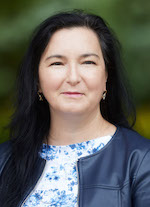Meet Implementation Specialist Molly Hughes and learn about her work on observations and coaching for educators, trainers, and RBPD specialists.
Molly Hughes joined CEED in April 2023 and divides her efforts between our Early Childhood Program Quality work and the Trainer and RBPD Specialist Support (TARSS) program. In this Q & A, she shares her thoughts on the power of relationships to support learning and professional growth.
What is the educational or career path that brought you to CEED?
I studied biology for my undergraduate degree. After college, I nannied for a family with triplets. When the triplets went to preschool, I needed a new adventure so I started my own business as a family child care provider. I ran that program for 22 years. During that time, I earned my master’s in early childhood from Concordia University and I became a trainer as well.
I closed my child care program because of competing responsibilities. Child care providers are sometimes in a position where they are not sure they can continue, often due to burnout. On the other hand, they are reluctant to step away because they know there is a severe shortage of care. For me, the tipping point came when I felt I could no longer be reliable for the families that my program served, because I occasionally had to close in order to care for elderly family members.
When this role opened at CEED, I knew it would be a good fit. I bring to the table decades of experience as a child care provider and trainer, so I can relate to and anticipate our audiences’ needs.
You mentioned becoming a trainer. Can you talk a little bit about what professional development looks like for child care providers?
Center-based and family child care providers are required to complete a certain amount of continuing education hours each year. Some trainings are fairly generic and cover important fundamentals, like active supervision, sudden unexpected infant death, and abusive head trauma. But beyond those basics, you are able to fill in your hours with things you choose.
I lucked out in becoming a trainer at a time when a lot of Training-of-Trainers (TOT) opportunities were being offered. TOTs prepare trainers to offer courses from the Department of Human Services. I got a lot of those under my belt. Then I started writing my own courses and delving into other topics. COVID also meant less demand for in-person training. So I decided to tilt my focus more towards course writing and trying to support providers, especially those who have been in the field for decades and are looking for something new and different.
What is your role at CEED?
My title is implementation specialist for the TARSS program. I also conduct CLASS™ observations and trainings and do field observations of Parent Aware coaches. I lead the trainer observation program for TARSS and co-lead our online learning community for RBPD specialists and our professional learning community for course writers. I gather data to determine the coaching needs for trainers and sometimes develop the content for those trainings. And I’m excited to say I’m organizing the TARSS Fall RBPD Retreat.
Those are a lot of different responsibilities! Is there a common thread that runs through them all?
The RBPD piece is the major common denominator. Whether I’m conducting a CLASS observation and sharing feedback with an educator, helping trainers access observations and coaching, or facilitating our online community for RBPD specialists, I am supporting early childhood professionals in improving their practice. This approach to professional development really complements traditional trainings because we know that often deeper learning occurs within the context of relationship-based professional development to which the learner is personally committed. The benefits flow from our work at CEED and in the TARSS program to the trainers, course writers, and RBPD specialists, and from there they flow to the educators, and finally they affect children and families. And that’s our ultimate goal: to benefit children and families.
What do RBPD specialists or coaches do for child care providers?
The goal of coaching for child care providers is to build a collaborative relationship that helps the provider choose an area that they want to develop. That could mean solving a problem. It could mean trying something new or gaining a new skill. The coach works with the provider to determine their goals and the area of growth they want to focus on. Then the coach supports them in figuring out how to get there.
Coaching is different from being a trainer conveying information to a trainee. The coach and the provider are sitting side-by-side. A coach doesn’t need to be the expert on everything–in fact, they can’t be. Instead, they have to be willing to dig in together with the provider as co-learners. A book I like on this subject is Coaching with Powerful Interactions. It gives key ideas about forming relationships, extending learning, and asking questions. Some of it feels very intuitive. These are definitely skills that coaches need to develop.
Research shows that coaching relationships can be more effective as professional development than training. Part of that is because once you’ve left a training, it’s on you to implement what you’ve learned. And although trainings can be inspiring, it’s not easy to retain that momentum on your own. With coaching, you decide what you want to change and improve. You have somebody to work with you, help you find resources, define action steps, listen to things that might get in the way of reaching your goals, help you problem-solve, and hold you accountable.
It really goes back to relationships. Think of teachers in your life who have made an impact on you. Often there is a solid relationship there. In my experience, the most effective training also makes use of relationships. People are often surprised to learn I am actually a shy introvert. I don’t like large groups; that’s not my jam. So, how am I up there, talking to a roomful of people? I can do it because to me, it’s a conversation. When I lead a training that becomes an authentic conversation, I come out of it full of energy. There’s that relationship thing again: connecting with people.
What would you like people to know about training and coaching for child care providers?
It’s crucial. Ultimately, the importance of training and coaching circles back to parallel process. Parallel process is a concept from reflective supervision that captures how a supervisor’s relationship with a frontline provider can play out in that provider’s relationship with the children or families they work with. We have to educate the educators in order for them to effectively educate children. When we take an RBPD-style approach to professional development for child care providers, we’re saying, “We’re co-learners. We’re asking questions together.” Parallel process means that providers establish the same pattern with children: “We’re letting children have a voice in what they want to learn and asking about what’s meaningful to them.”
What do you do for fun?
I read, hike, knit, and donate my knitted blankets. I read a little bit of everything. If someone hands me a book and says, “You should read this,” I’ll give it a try. I’m currently reading A Man Called Ove, and I’m in the middle of Outlander.
We love hiking in state parks and taking road trip vacations. The coolest was our trip to Washington and Oregon. We took two weeks and stopped and hiked every single day. My husband fishes, so over spring break we go to Kentucky which has really good state parks. Recently, we did six parks in three days. We did drive through Great Smoky Mountains National Park, but unfortunately it rained all day, and you couldn’t see the mountains. The ground was lovely, though!



